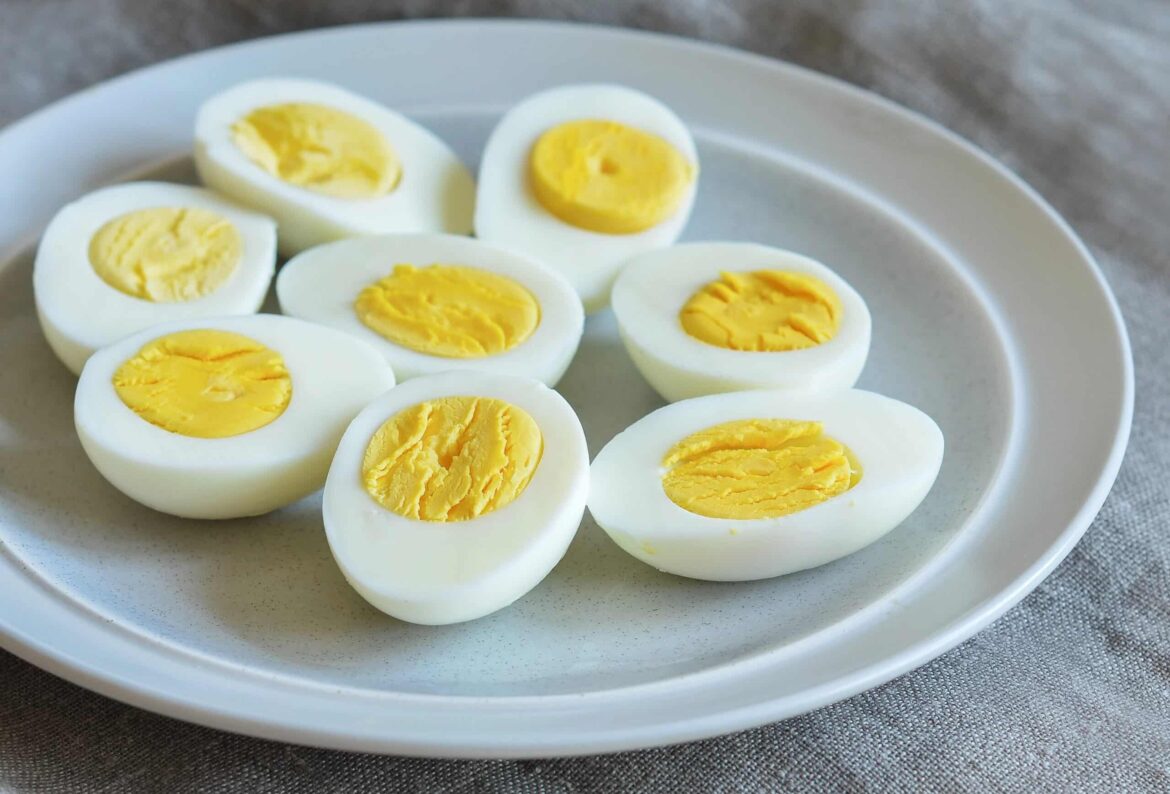Hard-boiling eggs can quickly become a science. In this practical tip, we reveal how long different eggs take to harden and how to prevent green edges.
Hard-boiling eggs in a saucepan: Cooking times according to size
A firm yolk, no green rim, and the perfect consistency: for many people, that’s what the perfect hard-boiled egg looks like. It has its place on the breakfast table in an egg cup, but also in salads or sauces. To cook the perfect egg, the first thing to keep in mind is the size of the egg. But the temperature of the egg, i.e. whether it comes straight out of the refrigerator or is already at room temperature, also plays a significant role in the cooking time.
- Small size S eggs that are already at room temperature take about eight minutes to harden. If they come straight out of the refrigerator, the cooking time is extended to about nine minutes.
- Medium-sized eggs should be cooked for about nine minutes at room temperature, while refrigerated eggs require about ten minutes.
- Large eggs (size L) are hard at room temperature after about ten minutes, and after about eleven minutes at refrigerator temperature.
- Extra-large eggs (size XL) reach their perfect consistency at room temperature after about eleven minutes, and after about twelve minutes when refrigerated.
Cooking eggs correctly: What you need to know
There are a few tips to keep in mind to prevent eggs from breaking during cooking.
- To cook the eggs as gently as possible, it is advisable to carefully place them in the already boiling water with a spoon. This prevents them from cracking when they hit the bottom of the pot. In addition, the water should not bubble vigorously, but should only simmer.
- If you want, you can also poke a small hole in the blunt end of the shell: This reduces the pressure inside, making it less likely that the egg will crack during cooking.
- By the way, rinsing the egg does not help against the green rim: This is a common misconception. The green rim occurs when you cook the eggs for too long or at too high a temperature. The sulfur in the egg reacts with iron compounds and forms a greenish-gray layer around the yolk. You can only prevent this by cooking the eggs for as long as necessary for their size and temperature.
- Rinsing with cold water is still a good idea: although it does not prevent the green rim, it stops the cooking process and makes peeling easier later on.
Steam cookers and egg cookers: Alternatives to the saucepan
If you cook and eat eggs very regularly, there are now more practical solutions than constantly putting the saucepan on the stove. You can also use a special egg cooker or even a steam cooker.
- The heat distribution in a steam cooker is particularly even: At 100 degrees Celsius and full steam power, medium-sized eggs take about twelve minutes to become completely hard.
- With a steam cooker, you not only cook the eggs gently, but you also don’t have to worry about anything burning or the water boiling over.
- An egg cooker is also a convenient way to cook eggs to perfection. Most appliances can be set to the desired degree of hardness and switch off automatically. This means you don’t have to keep checking the clock while the eggs are cooking.
- Both methods, using an egg cooker and a steam cooker, are energy-efficient and ideal for anyone who cooks eggs regularly. Some people also swear by cooking eggs in a hot air fryer.
Storage and shelf life: How to keep hard-boiled eggs fresh
How long hard-boiled eggs keep depends largely on whether or not they were rinsed under cold water after cooking. If you don’t rinse them and leave the eggs intact, their natural protective layer will remain intact.
- This way, you can easily store boiled eggs in the refrigerator for up to two weeks.
- However, if you have cooled the eggs with cold water, their shelf life is reduced to about five days. The water bath can cause fine cracks, which in turn allow bacteria to penetrate.
- If you have already peeled the eggs, you should store them in an airtight container in the refrigerator and consume them within two to three days. A simple method of checking is to date the eggs with a pencil after boiling or to store them separately from fresh eggs. This will prevent you from mixing them up.
- If you value quality and sustainability, you should opt for organic eggs. These can be identified by the “0” as the first digit of the code stamped on the eggshell, for example “0-DE-1234567”. The zero stands for organic farming, and the abbreviation “DE” stands for the country of origin, Germany.
- Unlike conventional eggs, organic eggs come from chickens that live in more species-appropriate conditions, have access to outdoor space, and are fed GMO-free feed.
- Even when cooked, organic eggs retain their nutritional value. However, fresh eggs are less suitable for hard-boiled eggs, as they are more difficult to peel after cooking. If you want to use hard-boiled eggs for Easter or a cold buffet, for example, it is best to use eggs that are a few days old.
- Hard-boiled eggs are particularly popular not only in egg salad or in French Niçoise salad with tuna, beans, and olives, but also as a stuffed variation, for example with a cream made from avocado, curry, or cream cheese.

